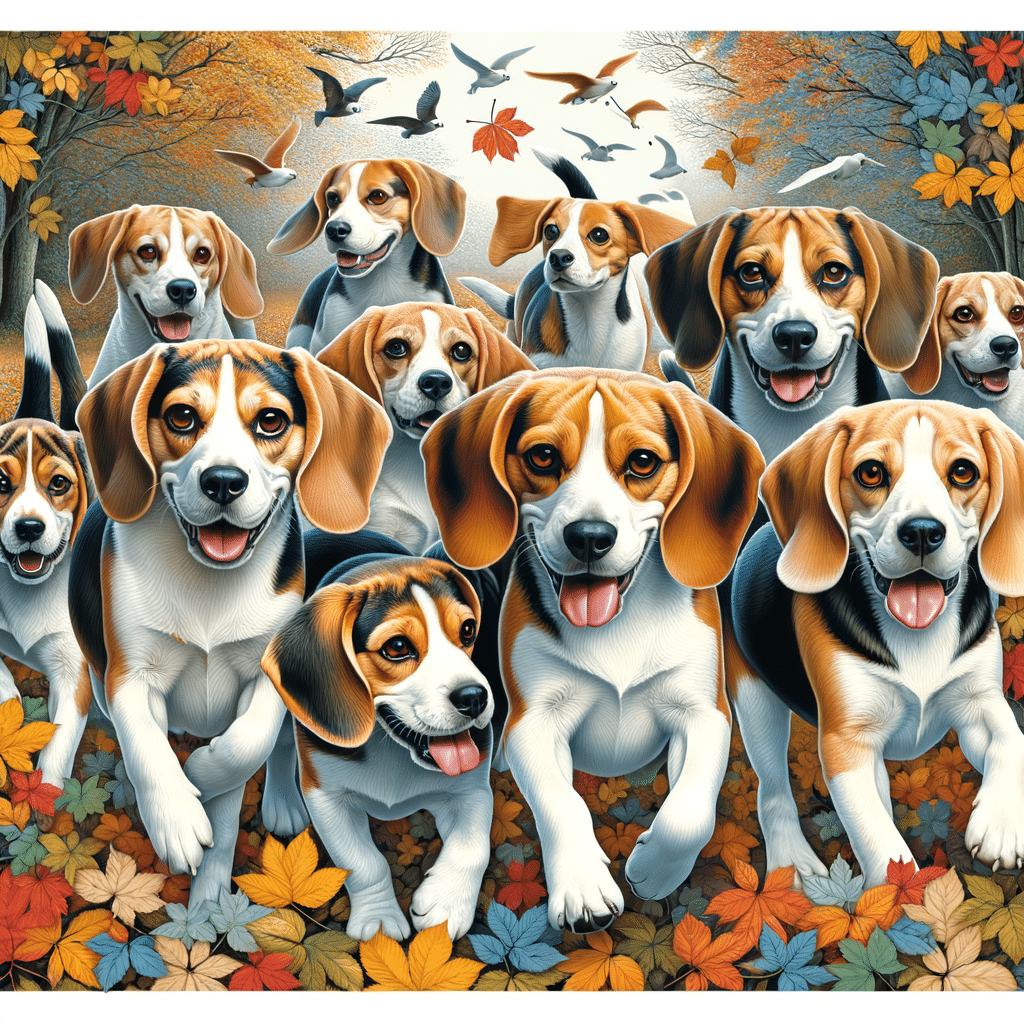Maintaining the health and wellness of your beagle begins with a proper vaccination regimen, which is critical to preventing various canine diseases. Like all dogs, beagles require core vaccinations that safeguard them against severe and often fatal conditions such as rabies, distemper, parvovirus, and adenovirus. These vaccinations are pivotal for the dog’s health and are often mandated by law, particularly the rabies vaccine.
In This Article
For beagle puppies, a specific schedule of puppy vaccinations starts as early as six to eight weeks of age. Following a structured timeline, puppies will receive multiple doses of each core vaccine at intervals of three to four weeks until they reach approximately 16 weeks of age. This schedule is vital for building a beagle’s long-term immunity as maternal antibodies decrease. In addition to core vaccines, veterinarians may recommend non-core vaccinations based on a beagle’s lifestyle, exposure risk, and geographic location. These may include vaccines for kennel cough, Lyme disease, and leptospirosis.
Beyond the initial vaccines, adult beagles require regular booster shots to maintain their immunity over time. The frequency of these boosters can vary based on the specific vaccine, local regulations, and a veterinarian’s assessment of the dog’s health and risk factors. Owners must consult their veterinarian to establish and adhere to a vaccination schedule tailored to their beagle’s unique needs.
Highlights
- Vaccinations are essential to protect beagles from serious diseases.
- Puppies follow a strict vaccination schedule starting at 6 to 8 weeks of age.
- Booster shots are necessary throughout a beagle's life to maintain immunity.
Essential Vaccinations for Beagle Health
Vaccinations are critical to a beagle’s healthcare regimen, protecting it from several potentially deadly diseases. The key to maintaining their health is to provide them with the full suite of essential vaccinations, divided into core and non-core categories.
Understanding Core Vaccines
Core vaccines are necessary for all beagles to prevent pervasive, highly contagious, or potentially deadly diseases.
The following core vaccines are universally recommended:
- Canine Distemper: A viral disease that can lead to severe neurological, respiratory, and gastrointestinal complications.
- Canine Parvovirus: Known for causing life-threatening gastrointestinal illness.
- Canine Adenovirus (Type 1 and Type 2): Adenovirus type 1 leads to canine hepatitis; adenovirus type 2 is associated with kennel cough.
- Rabies: A fatal viral disease, with vaccination often required by law due to the risk to humans and other animals.
Typically, these vaccines are administered in a combination vaccine, referred to as DHPP, which stands for distemper, hepatitis (adenovirus), parainfluenza, and parvovirus.
Non-Core Vaccines and Beagle-Specific Needs
Non-core vaccines are administered based on the individual beagle’s exposure risk, determined by factors such as environment and lifestyle.
These vaccines include:
- Canine Parainfluenza: Part of the kennel cough complex, often included in the DHPP vaccine.
- Bordetella Bronchiseptica: A highly contagious bacterial disease known for causing kennel cough; recommended for dogs frequently boarding or in group settings.
- Leptospirosis: A bacterial disease that can lead to kidney or liver disease; important for beagles exposed to wildlife or standing water.
- Lyme Disease: Caused by ticks and is especially concerning for beagles in areas with high tick populations.
While not every beagle needs every non-core vaccine, consulting your veterinarian can guide you on which may be beneficial based on an individual dog’s risk factors.
Beagle Puppy Vaccination Schedule
A beagle puppy’s vaccination schedule is critical for their health and must begin early in life. Initial vaccinations protect from common diseases, while booster shots maintain immunity as the puppy grows.
Initial Puppy Shots
Beagle puppies should receive their initial vaccinations from six to eight weeks. The core vaccines typically include protection against canine parvovirus, distemper, canine hepatitis, and parainfluenza.
Here is a typical schedule for the initial puppy shots:
- 6 to 8 weeks: DHPP (Distemper, Hepatitis, Parvovirus, Parainfluenza)
- 10 to 12 weeks: DHPP continuation
- 16 to 18 weeks: DHPP final dose
The puppies must visit a veterinarian for these vaccines to ensure health and proper administration.
Booster Shots and Revaccination
Following the initial puppy vaccinations, beagle puppies require booster shots to maintain their immunity. Their first booster should be given one year after completing the initial series. Subsequently, the revaccination is often recommended every three years. However, specific timelines may vary based on the veterinarian’s advice and state laws, especially for the rabies vaccine. Here is the booster shot schedule:
Puppy food, vet visits, and careful monitoring of the puppy’s health are also crucial during vaccination. Proper nutrition supports their developing immune system, while regular vet visits ensure that puppies stay on track with their vaccination schedule and health checks. Always consult with a licensed veterinarian for the most tailored and up-to-date vaccination schedule for your beagle.
Health and Wellness Beyond Immunizations
In addition to vaccinations, a beagle’s health and well-being are heavily influenced by regular veterinary check-ups, a structured exercise and nutrition plan, and consistent prevention against parasites. These components are pivotal in ensuring a healthy, vibrant beagle.
Regular Veterinary Care
Adherence to a scheduled veterinary routine is crucial for a beagle’s long-term health. These allow your vet to detect and treat any health issues. Priority should be given to annual check-ups, dental cleanings, and necessary diagnostic tests to monitor a beagle’s health status.
Exercise and Nutrition
Beagles are known for their high energy levels and require ample daily exercise to maintain their physical and mental well-being. They thrive on various activities, including walking, running, and playtime. Proper feeding with balanced canine nutrition tailored to their specific energy requirements prevents obesity and supports overall health.
An adult beagle should receive 1 to 1.5 cups of dry food per day, divided into two meals. The quantity will be adjusted based on exercise level, weight, and your veterinarian’s suggestions.
Parasite Prevention
Effective parasite prevention is non-negotiable for beagles. They should be regularly treated for common pests such as fleas and ticks, which are nuisances and can also carry diseases that might affect humans (zoonotic).
- Flea and Tick Prevention: Monthly topical treatments or oral medication.
- Heartworm: Year-round prevention is advised, especially in areas with a higher prevalence.
- Giardia: Ensure clean drinking water, and consider vaccination if recommended by your vet.
To ensure their furry companion remains fit, healthy, and happy, addressing these areas is essential for beagle owners.
Beagle Lifestyle Considerations
Beagle owners should prioritize suitable grooming practices and offer ample outdoor activities and socialization opportunities to maintain their dog’s health and happiness.
Grooming and Shedding
Beagles have a short, dense coat that typically comes in tan, brown, and white colors. They are moderate shedders and require regular brushing to reduce shedding and help them maintain a healthy coat. A weekly grooming session with a hound glove or a medium-bristle brush can effectively remove loose hair and distribute skin oils. Beagle ears should also be checked weekly for signs of infection and cleaned as needed since their floppy ears tend to trap moisture.
Outdoor Activities and Socialization
Due to their energetic and playful nature, beagles need daily exercise to stay fit and prevent obesity. Outdoor activities may include walking, jogging, or interactive games such as fetch. Beagles are scent hounds, so activities that allow them to utilize their sense of smell can be mentally stimulating and enjoyable. Dog parks can be excellent venues for beagles to socialize and play with other dogs. However, owners should know their propensity for chasing scents and ensure secure environments.
Proper socialization and consistent exercise can support a beagle’s well-being, potentially aiding their typical life expectancy of 12-15 years. Regular outdoor activity can also mitigate the risk of common health issues in beagles, such as seizures, allergies, and other conditions.
Frequently Asked Questions
This section addresses commonly asked questions regarding the vaccination requirements for beagles, detailing schedules, essential vaccines, potential side effects, and the different vaccine types for this breed.
What is the recommended vaccination schedule for a beagle puppy?
Beagle puppies typically begin their vaccination series at six to eight weeks, with boosters administered at three- to four-week intervals until they are around 16 weeks old. Core vaccines include distemper, adenovirus, parvovirus, and rabies.
Which are the essential vaccines an adult beagle should receive?
An adult beagle should maintain updated vaccinations for rabies, distemper, adenovirus, and parvovirus, which are considered core vaccines. Rabies vaccination frequency depends on state regulations; some require a booster every three years.
What are the common side effects of the 7-in-1 vaccine for dogs?
The 7-in-1 vaccine protects against several diseases, such as distemper and parvovirus. Side effects may include mild fever, lethargy, swelling at the injection site, and reduced appetite. Most side effects are short-lived and non-serious.
Can you list the names of vaccines typically administered to dogs?
Vaccines commonly given to dogs include the Rabies vaccine, Canine Distemper vaccine, Adenovirus vaccine, Parvovirus vaccine, and the Parainfluenza vaccine. Non-core vaccines could include Leptospira, Lyme disease, Bordetella, and others based on lifestyle and risk.
How often should a beagle receive booster vaccinations?
After the initial series, a beagle should receive booster vaccinations for core vaccines every one to three years. It’s vital to consult a veterinarian to establish a personalized vaccination schedule for each beagle.






